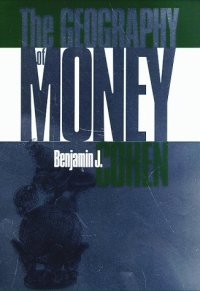
Ebook: The Geography of Money
Author: Benjamin J. Cohen
- Genre: Geography
- Year: 1998
- Publisher: Cornell University Press
- City: Ithaca
- Edition: 1ST
- Language: English
- pdf
Cohen does a good job of describing how the geography of money has mattered through out history and how that dynamic is changing in the current landscape. This work is actually very important as we look at the current world's state of affairs. Some key points.
First, he provides a brief, but thorough history of money since the Peace of Westphalia and shows that throughout time there have been many dominant currencies. However, no 1 single currency has maintained is dominance for a significant period of time. When we consider the British Sterling/pound and how much the dominance of this currency fell, it is particularly scary from a US dollar perspective.
Second, he discusses the way in which the nations at the top of the currency food pyramid can essentially continue their imperial dominance over the smaller states by way of tampering with their supply of US dollars. A wonderful example was Panama. Point 1 combined with this point is a little scary from he perspective of how the current financial crisis will play out given who holds our reserves.
Third,he describes how the borders of money continue to become increasingly blurred
My personal take away is that, it is not as straight forward as I had originally guessed to replace the major dominant currency with another currency. Even when a currency is in decline it takes many many years for the balance of power to shift. For periphery currencies, he change is quite quick though. Hence, when shorting the USD, one really needs to be careful on timing.
Another take away is the more philosophical idea of what is money. The book discusses that it is a policy measure to incentive certain actions. For those countries that can control their money supply it appears to provide a fantastic method by which they can truly effect policy. For those nations lower on the money food chain, it provides a terrible means by which another country can incentives policy in your nation, without violence or actual presence on your soil. Fascinating and yet disturbing....
First, he provides a brief, but thorough history of money since the Peace of Westphalia and shows that throughout time there have been many dominant currencies. However, no 1 single currency has maintained is dominance for a significant period of time. When we consider the British Sterling/pound and how much the dominance of this currency fell, it is particularly scary from a US dollar perspective.
Second, he discusses the way in which the nations at the top of the currency food pyramid can essentially continue their imperial dominance over the smaller states by way of tampering with their supply of US dollars. A wonderful example was Panama. Point 1 combined with this point is a little scary from he perspective of how the current financial crisis will play out given who holds our reserves.
Third,he describes how the borders of money continue to become increasingly blurred
My personal take away is that, it is not as straight forward as I had originally guessed to replace the major dominant currency with another currency. Even when a currency is in decline it takes many many years for the balance of power to shift. For periphery currencies, he change is quite quick though. Hence, when shorting the USD, one really needs to be careful on timing.
Another take away is the more philosophical idea of what is money. The book discusses that it is a policy measure to incentive certain actions. For those countries that can control their money supply it appears to provide a fantastic method by which they can truly effect policy. For those nations lower on the money food chain, it provides a terrible means by which another country can incentives policy in your nation, without violence or actual presence on your soil. Fascinating and yet disturbing....
Download the book The Geography of Money for free or read online
Continue reading on any device:

Last viewed books
Related books
{related-news}
Comments (0)